We were hiding from lynch mobs, not the law: Umar & Anirban
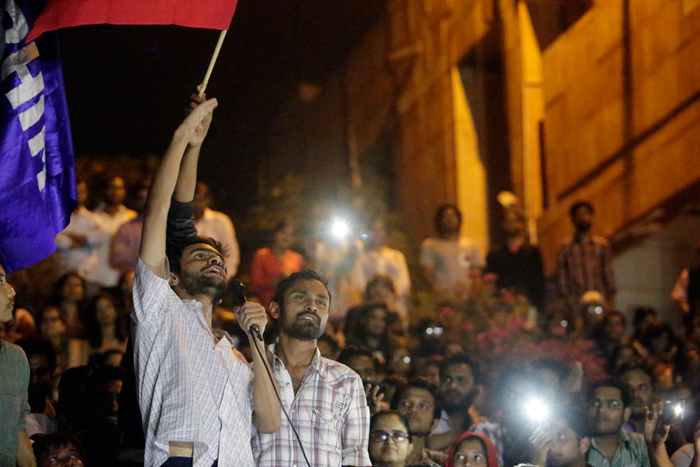
Catch's conversation with India's two most well-known students -- after Kanhaiya Kumar - Umar Khalid and Anirban Bhattacharya starts on an uplifting note.
Kanhaiya, the JNU Students Union president, had left a message in his jail cell for whoever occupied it next when he was released on bail on 4 March. As it happened, it was Anirban who discovered the message scribbled on the wall of Cell 18, Ward 4 of Tihar Jail.
Also read - Umar, Anirban say they are proud of sedition charge
It read: "India is the largest democracy in the world, let's think... equality is indispensable for democracy".
For the next 15 days, Anirban stayed in the cell with this message. When it was his time to leave, Bhattacharya left his own parting thought on the wall for the inmates who would follow him there. It would tell the discerning ones among them something about the young man who had once stayed within those four walls, about the thoughts that had moved him, the emotions he wanted the world to share after he had moved on.
This is what he wrote besides Kanhaiya's message: "People shouldn't be afraid of their governments, governments should be afraid of their people."
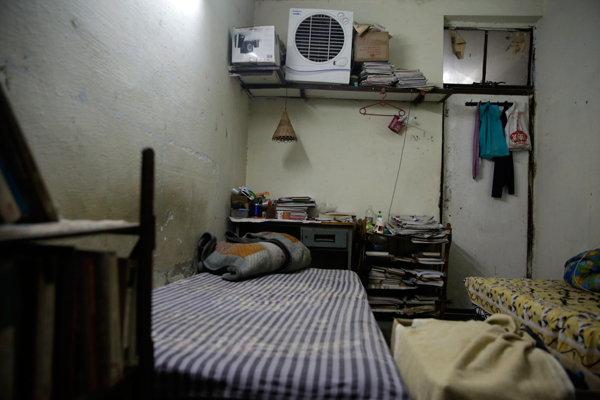
Umar Khalid's hostel room. Photo: Vikas Kumar/Catch News
Anirban - Ban to his friends - and Umar say they are stronger from their experiences over the past three weeks. The weeks during which they went hiding from lynch mobs, returned to court arrest, heard about their families' harassment, were interrogated by the Delhi Police's notorious Special Cell, went to jail not knowing when they would come out, and finally returned to the JNU to a welcome reserved for celebrities in this country.
I plan to teach for a living. I had thought of becoming a journalist once, but no more: Anirban
Some of their friends fear that the venom that's being spitted against them, particularly the conspiracy theories about Umar's "links" with terror groups have gained such currency that they could be lynched any moment.
It's hard to say if Umar and Anirban share this fear, for they don't betray it during this conversation. Here, they talk about their lives before, during and after their time in jail.
To begin with, while the two of you were in jail, there were stories about your requests for momos, biryani, cigarettes, about how you gave your interrogators a hard time with lectures on subaltern studies.
Anirban: Haha. Yes, we learnt about it, too. No, we didn't ask for momos, nor did we demand biryani. And all these stories about us giving lectures to policemen on subaltern studies are rubbish. Yes, there was a moment when I requested the police for cigarettes. And how we came to that funny situation I can't reveal as it's part of the interrogation, and our case is still sub judice.
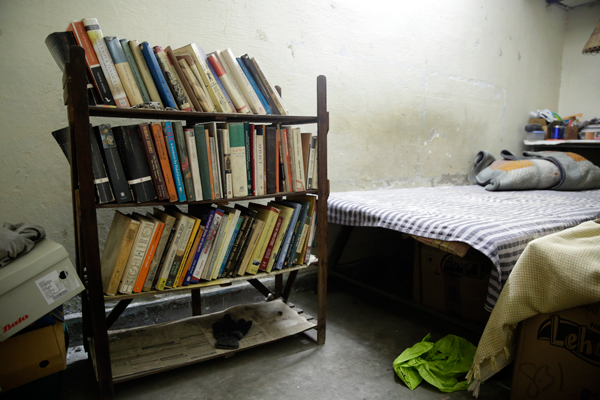
Umar's room on campus. Photo: Vikas Kumar/Catch News
When did you find out about your bail order?
Umar: It was about 4 in the afternoon and I was watching TV when there was a news flash on the screen. That's how I got to know.
Anirban: Umar was in the cell right next to mine, in number 17. We used to shout to each other. And as soon as there was a news flash he shouted across loudly, "Ban, bail mil gaya."
We had made friends with some policemen inside the jail. We used to speak to them at length. There was one day when it was raining heavily. One of the policemen made a paper boat and gave it to me through the window. I still have it. I think we will all miss each other.
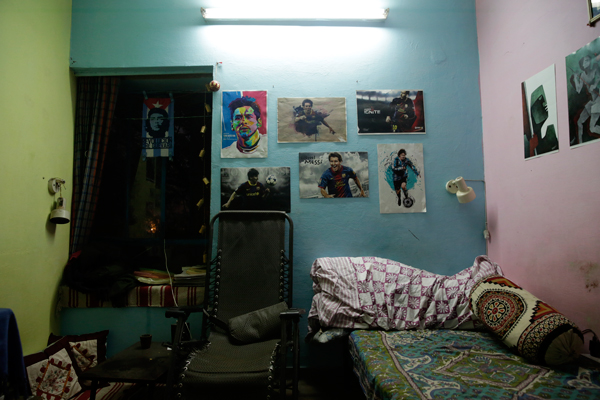
Anirban's hostel room. Photo: Vikas Kumar/Catch News
Could you share what thoughts occupied you, about yourself and your families, in jail. Was there ever a moment when you felt you had run out of luck and hope?
Anirban: My family was not comfortable at all during this whole time. In between, my mother also fell ill. But all of us were got a lot of unexpected support from other people. Once we came out of jail, things got better for my family.
I think Umar's family braved it pretty well. Because of the manner in which his community is targeted and because they have seen so much of it, they could cope with it. Such witch-hunt is something an upper class Brahmin family like mine could never cope up with.
The one time we felt genuinely scared was when we found out that our case had been transferred to the Delhi Police's Special Cell, the "specialists" who deal mostly with terror-related cases. We felt that Mr Bassi (the recently retired Delhi police chief, BS Bassi) had given us one last parting gift.
One day it was raining heavily. A cop outside my cell made a paper boat and gave it to me: Umar
Umar: It's true. We were really scared at that time. I found out that our posters had been put up as far as away as Alwar. Anyone who was with us was targeted. My sister Sarah, who is 12 and who spoke here in JNU yesterday, couldn't appear for her exams because of all the threats - of murder and rape that my family was receiving almost every other day. One day a man claiming to be an underworld don called up my father and threatened to kill me.
I was told that my supervisor had written an article in my support in The Indian Express and for that she received a lot of hate mail. My sisters still can't leave home without escort. And then there were the TV channels, of course.
I think all of them were being directed to show what they were showing. I believe this because there were similar narratives - the issue of "subsidy", of my alleged links with Jaish-e-Muhammad and supposed relation with Afzal Guru. Two-three channels ran these stories and as they were called out, they dropped them without any apologies or disclaimers. And they repeated the claim made by the home minister about Hafiz Saeed's links with us which turned out to be based on a fake Twitter account.
The people running these channels didn't understand that they were dealing with human beings, whose lives were being affected in unimaginably adverse ways because of them.
The stories about Umar and I giving lectures to cops on subaltern studies are rubbish: Anirban
Let me add here that I was called a member of Jaish-e-Muhammed only because I am a Muslim. A story about Ban making trips to Pakistan would never have sold on TV.
Sometimes you think you have transcended things like religion and caste, but instances like this show you how you can never escape your identity.
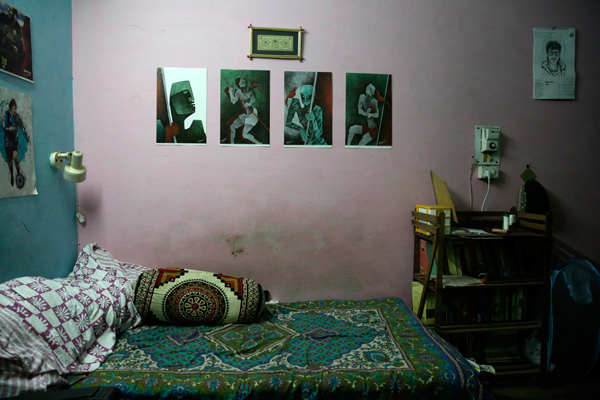
Photo: Vikas Kumar/Catch News
Why did you go into hiding, which for some was an admission of guilt on your part? And what made you resurface in the JNU?
Umar: We were not hiding from the law. The first FIR that was lodged in this case did not have any names. We were hiding because of this "anti-national" campaign against, we were only hiding from lynch mobs.
Anirban: But then we heard that lookout notices had been issued for us. That's when we realised we had to resurface. Hiding from the law was never our motive. It was the extrajudicial law we were running from. We feared for our lives.
My sister Sarah, who is 12, couldn't appear for her exams because of the rape and murder threats: Umar
What do you make of the support you have received all this while. Do you think the enthusiasm the public showed for Kanhaiya was perhaps lacking in your case?
Anirban: No, I think there was a lot of support for us. We saw the human chain from the main gate of JNU till Chandrabagha hostel, and I wished we could be a part of it. I feel that these are historic moments and looking back people will remember who stood where in this struggle. The struggle which is being led by the country's students today.
Umar: Yes, there was a lot of support for us. We came to know about the marches carried out in our name outside India, in New York, for instance. That gave us hope. We need to keep this solidarity going into the coming years.
Two quick questions. What were you reading in jail? And what are your future plans?
Anirban: I plan on finishing my PhD on the tea plantations in the north of West Bengal. Then I plan to teach for a living. I had considered becoming a journalist once but I am not so sure about that now. I read Amitav Ghosh's Flood of Fire. I had also ordered a book on a German philosopher's interpretation of Marx, but I left the jail before it arrived.
Umar: I, too, have my PhD on the 200-year history of Singhbhum to work on. Then I will see what I'll do with my life. But whatever I do, I'll remain politically active, of that I am sure. What I read in jail was Manisha Sethi's Kafkaland, and I re-read Arundhati Roy's God of Small Things.
More in Catch - Umar Khalid is no jihadi. BJP is pushing him the Rohith way
Umar Khalid & Anirban Bhattacharya surrender. But students vow to continue Rohith's fight






![BJP's Kapil Mishra recreates Shankar Mahadevan’s ‘Breathless’ song to highlight Delhi pollution [WATCH] BJP's Kapil Mishra recreates Shankar Mahadevan’s ‘Breathless’ song to highlight Delhi pollution [WATCH]](https://images.catchnews.com/upload/2022/11/03/kapil-mishra_240884_300x172.png)

![Anupam Kher shares pictures of his toned body on 67th birthday [MUST SEE] Anupam Kher shares pictures of his toned body on 67th birthday [MUST SEE]](https://images.catchnews.com/upload/2022/03/07/Anupam_kher_231145_300x172.jpg)






